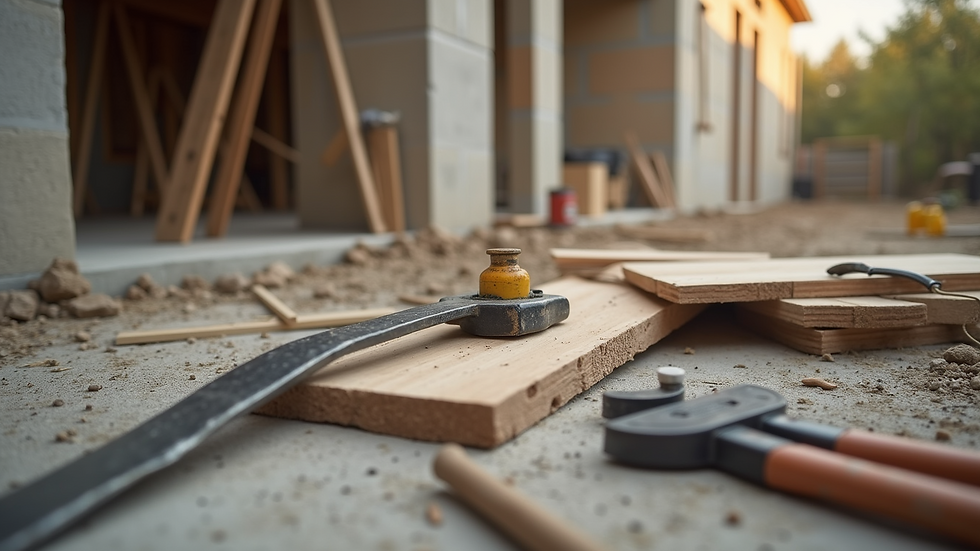Essential Tips to Prepare for Your First Meeting with a Contractor
- Samuel B.
- Sep 6, 2025
- 4 min read
Meeting a contractor for the first time can bring both excitement and nervousness. If you are planning a home renovation or even a simple repair, the initial meeting is crucial. It sets the stage for your entire project. To make sure that your ideas are clear and that you build a strong working relationship, being well-prepared is key. This guide offers practical tips to assist you in preparing for your first meeting with a contractor. If you want to see the kinds of projects DBG handles (kitchens, baths, additions, basements and more), check their Services page.
Understand Your Project Scope
Before scheduling your meeting, clearly define your project’s scope. What do you want to achieve? For example, if you aim to remodel a kitchen, decide whether you want a full gut remodel or simple finish updates—DBG’s Kitchen services page shows typical scopes and deliverables you can reference.
Create a detailed list of must-haves and nice-to-haves to help prioritize goals. For instance, if new countertops are a must but the backsplash is optional, that clarity helps the contractor provide a more accurate estimate.
Research Potential Contractors
Not all contractors approach projects the same way. Do your homework before your meeting: read reviews, ask friends or family for recommendations, and verify licenses and insurance. Look specifically for contractors who have completed projects similar to yours—for example, if you’re finishing a basement or converting an attic, check portfolios that feature Basement services and Attic (see the Services menu) to confirm relevant experience.
Prepare Questions to Ask
Arriving with a list of questions can maximize the value of your meeting. Here are some vital questions to consider:
What is your experience with projects like mine?
Can you share references from past clients?
How long do you estimate the project will take?
What steps do you take when facing unexpected issues?
How will the payment schedule be structured?
These questions allow you to evaluate the contractor’s expertise, integrity, and approach to communication.
Gather Visual Inspiration
Visual aids greatly improve communication. Collect images from magazines, websites, or social media that showcase the style you envision. A mood board or folder of photos helps the contractor understand your aesthetic—whether you’re aiming for a modern kitchen, a cozy sunroom, or a functional home office. DBG’s Home Office services and Sunroom services can provide examples to reference.
You might create a mood board or a digital folder filled with these images. For example, if you're aiming for a rustic kitchen look, include pictures of reclaimed wood, farmhouse sinks, and muted color palettes. This prepares the contractor to understand your preferences and tailor their recommendations accordingly.

Set a Budget
A clear budget is essential for your project’s success. Before the meeting, determine a realistic spending range. Consider the average cost for your project type. According to HomeAdvisor, kitchen remodels can range from $25,000 to $50,000. If you plan to spend around $35,000, clearly communicate this budget during the meeting.
Being upfront about your financial limits can help the contractor offer solutions that align with your budget—perhaps suggesting cost-effective materials or alternative designs.
Be Open to Suggestions
While it’s important to have a vision, be receptive to contractor suggestions. Professionals often bring solutions grounded in experience—structural advice, sequence optimizations, or material substitutions that save money without sacrificing quality. For finish and trim recommendations that preserve design intent, ask about their Millwork services.
For instance, if you envision an open space but the contractor suggests maintaining a wall for better structural integrity, consider their expertise. This collaborative mindset can lead to a more successful outcome.
Discuss Communication Preferences
Effective communication is essential for a smooth working relationship. Discuss how you prefer to receive updates and the best means of communication—whether by phone, email, or in-person meetings.
Setting expectations about frequency and methods for updates will help keep you informed and engaged throughout the project, ensuring both you and the contractor are aligned.
Review the Contract Thoroughly
Once you select a contractor, they will draft a contract detailing the project's scope, timeline, and payment terms. Take the time to review this carefully.
Ensure that all aspects of your project are clearly defined. For example, if you specified a certain type of flooring, double-check that it is included in the contract. If you have any questions or uncertainties, ask for clarification before signing.
Prepare for the Unexpected
Even with thorough planning, unexpected issues can arise. It is important to be ready for delays, budget adjustments, or changes in scope.
Discuss how the contractor deals with these scenarios and what backup plans they have in place. Knowing there is a strategy for handling surprises can give you peace of mind.
Keep the Connection Alive
After the meeting, send a brief thank-you email that confirms next steps and any follow-up items. This demonstrates professionalism and keeps momentum. If you’re ready to move forward, DBG’s Request a Quote form is a quick way to begin the formal process.
Final Thoughts
Preparing for your first meeting with a contractor does not have to be challenging. By understanding your project scope, researching potential contractors, and preparing key questions, you set yourself up for a successful collaboration.
Remain open to the contractor's suggestions and prioritize clear communication. Take the time to thoroughly review the contract before signing. By following these valuable tips, you will feel more confident as you approach your first meeting and embark on your project journey.

If you want professional help getting started—whether a kitchen, bathroom, basement, sunroom, deck, or full home renovation—explore DBG Contracting’s Services and submit a request to get an estimate.



